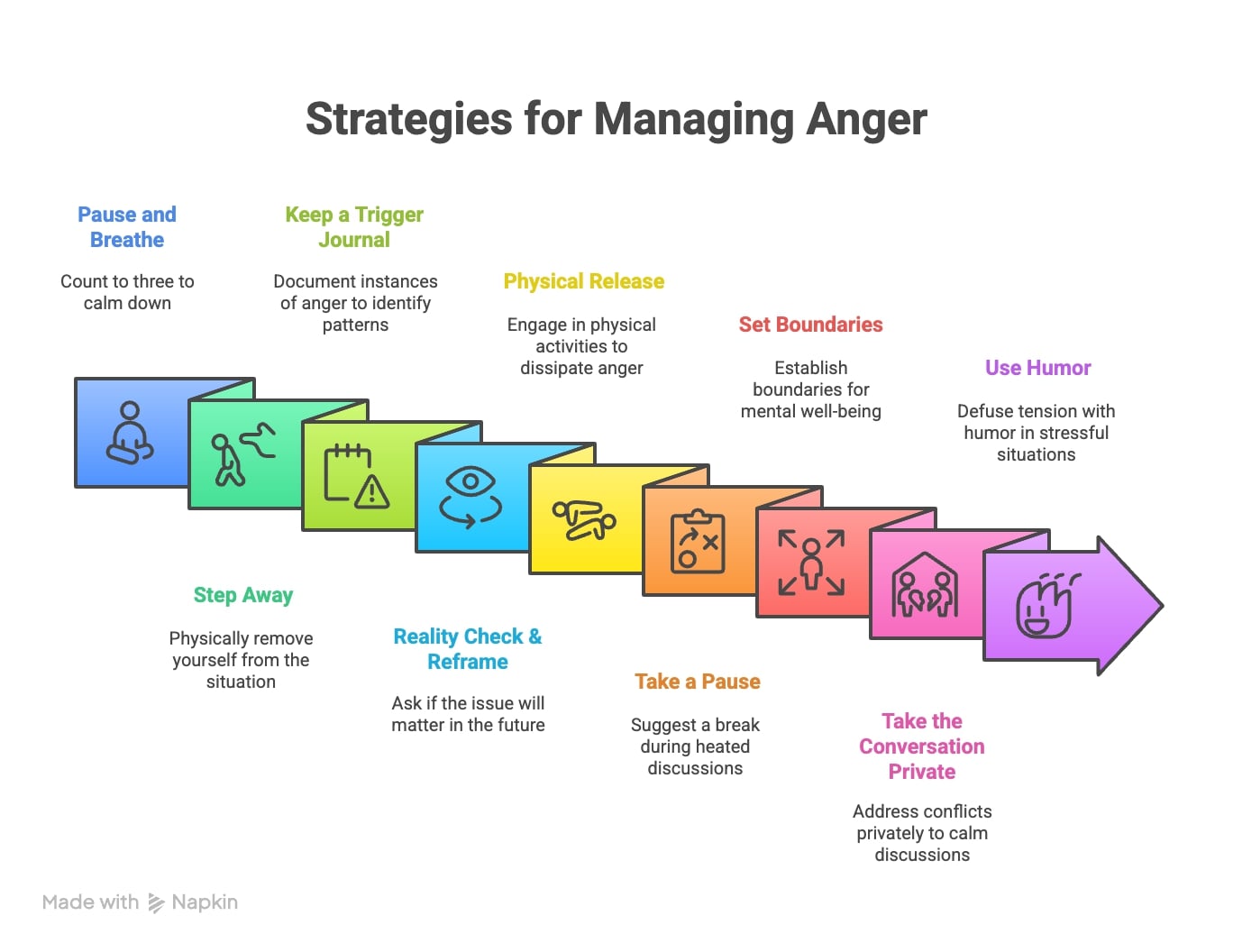
Amaha / / / How to Control Your Anger Issues: Practical Strategies That Actually Work
ARTICLE | 7 MINS READ
How to Control Your Anger Issues: Practical Strategies That Actually Work
Published on
27th May 2025

Dr Anuradha Kabra
MD Psychiatry

Remember that moment when your blood started boiling? When someone cuts you off in traffic, or your boss dumps another "urgent" project on your desk at 6 PM? We've all been there. Intense anger outrage leaves you feeling more burnt out than making you feel relieved.
Anger is a normal human emotion. The problem starts when it controls us instead of us controlling it.
Why Do We Get So Angry? - The hidden triggers
Anger is basically our brain's alarm system. After our emotions cross a certain threshold there are different ways in which you let those emotions out, one such outlet is Anger.
Sometimes, it’s justified—like when you see someone being treated unfairly. Other times, it’s just a reaction to stress, hunger, or the feeling that life isn’t going your way. In many Indian families, anger is either suppressed (“good people don’t get angry”) or mistaken for passion. But neither helps you actually manage anger issues.
What Actually Triggers Those Anger Outbursts?
Understanding your triggers and thoughts that cause anger is half the battle won.
- Feeling disrespected or ignored (like being interrupted mid-sentence)
- Physical discomfort (hunger, exhaustion, heat)
- Unmet expectations (colleagues not putting effort in their work)
- Financial stress or relationship conflicts
- Daily hassles (traffic, delays, noisy neighbours)
Recognising your triggers is the first step in learning how to control anger problems. When you know what sets you off, you can prepare better responses
Where Did You Learn to Get So Angry?
Here's an uncomfortable truth: most of us learned anger from watching others. Maybe it was your dad yelling at traffic, your mom getting frustrated with household help, or that uncle who always raised his voice during family discussions. Children are like emotional sponges – they absorb everything. If anger was the go-to response for frustration in your household, you probably picked up those same patterns. Some families treat shouting as normal communication, while others use silent treatment as punishment. Both are unhealthy anger expressions. The good news? What was learned can be unlearned. You’re not stuck with unhealthy anger patterns forever. Controlling your anger is essential for leading a happier and peaceful life.

Is your anger caused by Anxiety?
Find out the internal issues behind those anger outbursts, Is your anger actually an anxiety problem in disguise?
How to Control Anger in the Moment (When You're About to Explode)
Let me share something that changed my perspective completely. A friend once told me, "Anger is just sadness wearing a mask." Sounds philosophical, right? But there's real wisdom there.
1. The 3-Second Rule That Actually Works
When you feel anger rising, count to three. This short pause helps the initial chemical rush of anger start to subside. Here's why it works: it takes exactly three seconds for the initial chemical rush of anger (cortisol and adrenaline) to start subsiding.
During those three seconds, take a deep breath. And I mean a proper one – the kind your grandmother would approve of when she'd say "beta, shaant ho jao."
2. Step-Away
This might sound simple, but step away. Literally. If you're in an argument with your spouse, physically removing yourself from the situation helps you cool down and see things more clearly. Whether it’s stepping out onto the balcony during a family argument or taking a bathroom break at work, distance gives you perspective. Suddenly you can see the whole picture instead of just the messy situation or the moment.
How to Deal with Anger outbursts - Long-term Anger Management
Managing anger isn't just about controlling outbursts. It's about understanding your patterns. Do you get angrier when you're hungry? ("hangry" – it's a real thing!) Are you more irritable during the monsoon season? After a bad night's sleep?
1. The Trigger Journal Method
Start noting down when you get angry. Like this:
- Tuesday morning: Got angry at auto driver for taking longer route
- Wednesday evening: Snapped at mom for asking about dinner plans
- Friday afternoon: Lost temper in team meeting
You'll start seeing patterns. Maybe it's always when you're rushed. Maybe it's when you feel unheard. Knowledge is power, as they say.
2. Building Your Anger Management Toolkit
Just like you keep basic medicines at home, you need an anger management toolkit. Here are some techniques that work:
- The Reality Check: Ask yourself, "Will this matter in five days/months/years?" Most times, the answer is no.
- The Reframe Game: Instead of "This person is trying to annoy me," try "This person might be having a bad day too."
- Physical Release: Channel your energy into something active—take a walk, do jumping jacks, or even clean your room. Physical movement helps dissipate anger.
How to Control Anger in Relationships?
Relationships are where anger gets messiest. With strangers, we can walk away. With family and friends? Not so much.
1. The Art of Strategic Pausing
In the middle of a heated argument with your partner, try saying, "I need five minutes to think about this." It's not giving up – it's being mature enough to prevent saying something you'll regret later.
Indian families can be... intense. Everyone has opinions about everything, from your career choices to what you should eat for breakfast. Learning to set boundaries isn't disrespectful – it's necessary for your mental health.
2. The "I" Statement Magic
Instead of "You always interrupt me," try "I feel unheard when conversations move too fast for me to contribute." See the difference? One attacks, the other explains.
Controlling Anger at the Workplace (Without Getting Fired)
Office anger is a special beast. You can't exactly yell at your manager, even when they deserve it. But you can't bottle it up either – that's a recipe for a breakdown.
1. The Professional Anger Response
When someone undermines you in a meeting or takes credit for your work, resist the urge to call them out immediately. Instead, schedule a private conversation. Say something like, "I'd like to discuss the presentation we just had. When would be a good time?"
This approach serves two purposes: it gives you time to cool down, and it often catches the other person off-guard in a good way. They're expecting anger; they're getting professionalism.
2. The Bathroom Break Strategy
Seriously, don't underestimate the power of a bathroom break. It's the one place you can go without explanation, take deep breaths, splash some water on your face, and remind yourself that your paycheck depends on keeping your cool.
Road Rage: How to Control Anger While Driving?
If you've driven in any Indian city, you know road rage is practically unavoidable. Everyone's in a hurry, traffic rules are more like... suggestions, and patience is in short supply.
1. The Commentary Technique
Instead of cursing at the car that just cut you off, try commenting like a cricket commentator: "And there goes the red Maruti, making a bold move without indicators. Interesting strategy, let's see how it plays out."
It sounds silly, but humour deflates anger faster than anything else.
2. The Driving Mantra
Create a driving mantra. Something like "I will reach safely, not just quickly" or "Everyone's trying to get somewhere, just like me." Repeat it when traffic gets crazy.

When Anger Becomes a Serious Problem
If your anger is leading to frequent outbursts, strained relationships, or affecting your work, it might be time to seek professional help. There’s no shame in talking to a therapist—mental health is just as important as physical health. Chronic anger can even cause physical symptoms like headaches, sleep problems, and high blood pressure.
Physical Symptoms to Watch For
Chronic anger can show up physically too:
- Frequent headaches
- Digestive issues
- Sleep problems
- High blood pressure
Your body keeps score, even when your mind tries to ignore it.
Modern Anger: The Digital Age and Post-Pandemic Reality
Anger looks different in 2025. Social media has become a 24/7 rage machine. You're scrolling through Instagram, seeing everyone's highlight reels while you're stuck in traffic or dealing with a difficult day, and you can so much hate coming out in the comments section. Twitter arguments over everything from cricket matches to political opinions can ruin your entire evening. The constant notifications, online trolling, and digital FOMO create a low-level irritation that wasn't there before.
Post-pandemic, we're all carrying extra emotional baggage. The isolation, health anxiety, and financial uncertainty have left many of us with shorter fuses. Work-from-home has blurred boundaries completely – your spouse interrupts important calls, kids barge into video meetings, and there's no physical separation between work stress and personal space. Couples who used to have 8-hour breaks from each other are now together 24/7, leading to friction over trivial things like who forgot to mute during calls or whose turn it is to manage the WiFi issues.
The Long Game: Building Emotional Intelligence
Controlling anger isn't just about suppression – it's about emotional intelligence. It's learning to recognize emotions early, understand their messages, and respond rather than react.
The Daily Check-in
Start each day with a simple question: "How am I feeling right now?" Not just "fine" or "okay" – really check in. Tired? Anxious? Excited? The more aware you become of your emotional state, the better you can manage it.
Gratitude as an Anger Antidote
Gratitude genuinely helps with anger management. When you're focused on what's going right, it's harder to obsess over what's going wrong.
Keep it simple. Three things you're grateful for each day. Could be as basic as "The power didn't go out today" or "Mom made my favorite dish."
How Therapy Strategies Can Transform Your Anger Management
- Professional therapy isn't just about lying on a couch talking about your childhood – though that might help too! Modern therapeutic approaches offer practical, science-backed tools for anger control. Therapy and counselling both can help with learning and practising anger management.
- Cognitive Behavioral Therapy (CBT) is particularly effective because it helps you identify the thoughts that fuel your anger. Instead of "Everyone's out to get me," you learn to think "This person might just be having a bad day."
- Dialectical Behavior Therapy (DBT) teaches distress tolerance – basically how to sit with uncomfortable emotions without exploding. The STOP technique (Stop, Take a breath, Observe, Proceed mindfully) comes from DBT and works wonders in heated moments.
- Mindfulness-based therapy helps you become aware of anger as it builds, rather than getting blindsided by rage. Many therapists in Indian cities now offer online sessions, making it more accessible than ever. Group therapy sessions can be especially helpful – there's something powerful about realising you're not the only one struggling with anger issues.
The Path Forward
Learning how to control anger issues is a journey. Some days will be easier than others, but every small step counts. Remember, the goal isn’t to never get angry—it’s to handle anger in ways that protect your peace and your relationships. You’ve got this—one breath, one moment, one choice at a time.
Also read: Ways to cope with Anger issues.

Want Professional Help with your Anger Issues?
Get a Free Coach call to discuss how Amaha can help you control your anger issues
Frequently Asked Questions
1. How can I stop myself from saying hurtful things when I'm angry?
The key is creating a pause between feeling and speaking. Try the "tongue to roof" technique – literally press your tongue to the roof of your mouth for 10 seconds. This physical action interrupts the emotional impulse and gives your rational mind time to catch up. Also, remind yourself that words can't be taken back, but a pause can save relationships.
2. Is it normal to feel physically sick after getting very angry?
Anger triggers a massive stress response in your body – increased heart rate, blood pressure spikes, muscle tension, and hormone floods. After the anger subsides, your body needs to recover, which can leave you feeling drained, nauseous, or headachy. This is why learning anger management isn't just about emotions – it's about physical health too.
3. How do I deal with people who seem to deliberately trigger my anger?
First, recognise that you can't control others' behavior, only your response. Some people might enjoy getting a reaction, so not giving them one often solves the problem. For those who seem to push your buttons unconsciously, try the "grey rock" method – be polite but boring. Don't give them emotional fuel to work with.
4. Can anger issues be genetic? My whole family has anger problems.
While there's some genetic component to temperament, anger issues are largely learned behaviors. If you grew up in a household where anger was the primary way of expressing frustration, you likely learned those patterns. The good news? Learned behaviors can be unlearned and replaced with healthier responses.
5. How long does it typically take to see improvement in anger management?
With consistent practice, most people notice some improvement within 2-4 weeks. You might start catching yourself before you explode, or notice your anger doesn't last as long. Significant changes usually take 2-3 months of regular practice. Remember, you're essentially rewiring brain patterns that may have been years in the making – be patient with yourself.
6. How to calm down an angry person?
To calm an angry person, stay calm yourself and listen without interrupting. Use a gentle, low voice and avoid arguing back. Give them space to express their feelings, validate their emotions by saying "I understand you're upset," and suggest taking a break. Don't take their anger personally - focus on de-escalation.
7. Can someone with anger issues change?
Yes, people with anger issues can absolutely change through consistent effort and proper techniques. Anger management therapy, cognitive behavioral therapy, and mindfulness practices show proven results. Change requires recognizing triggers, learning coping strategies, and practicing new responses. With professional help and commitment, most people see significant improvement within 2-3 months.
8. Does anger affect the brain?
Anger significantly affects the brain by triggering the amygdala (fight-or-flight response) and reducing prefrontal cortex activity (logical thinking). Chronic anger increases cortisol levels, damages memory centers, and can shrink brain tissue over time. Frequent anger episodes impair decision-making abilities, emotional regulation, and increased risk of depression and anxiety disorders.
Was this article helpful?
Yes
No
If you didn't find what you were looking for, please reach out to us at [email protected] or +912071171501. We're here for you - for anything you might need.



Build a good life for yourself
with Amaha
Best App
for Good
on Google Play India

